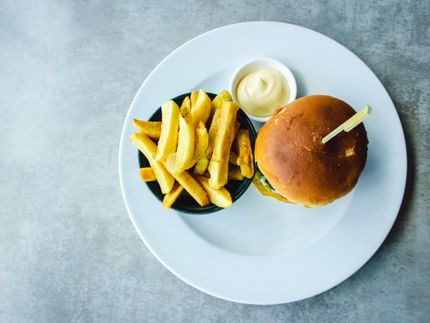Fasting acts as a diet catalyst
Advertisement
If you need to change your diet to normalize your blood pressure, you should start with a fasting cure. Scientists from MDC and ECRC describe in the journal "Nature Communications" why patients can improve their health in the long term.

Bild von Tumisu auf Pixabay
Every fourth German suffers from metabolic syndrome. In this "deadly quartet", four diseases of affluence occur simultaneously: Obesity, hypertension, dyslipidemia and diabetes mellitus. Each of these is considered a risk factor for serious cardiovascular diseases, such as heart attacks or strokes. Treatment is aimed at reducing weight and normalising fat and carbohydrate metabolism and blood pressure. In addition to exercise, doctors prescribe a low-calorie and healthy diet. In addition, drug treatment is often necessary. However, the effects of diet on the microbiome, the immune system and thus on the state of health have not been fully clarified.
A research group led by Dr. Sofia Forslund and Professor Dominik N. Müller of the Max Delbrück Center for Molecular Medicine in the Helmholtz Association (MDC) and the Experimental and Clinical Research Center (ECRC) has now investigated the effects of dietary changes in people with metabolic syndrome. The ECRC is a joint facility of the MDC and the Charité - Universitätsmedizin Berlin. "A change to healthy food has a positive effect on blood pressure," Andras Maifeld summarizes the results. "If the diet is preceded by a fasting cure, this effect is even amplified." Maifeld is lead author of the paper, which has just been published in the journal Nature Communications.
Broccoli instead of roast beef
Dr. Andreas Michalsen, Chefarzt of the department naturopathy in the Immanuel hospital Berlin and owner of the Stiftungsprofessur for clinical naturopathy at the Institut for social medicine, epidemiology and health economy of the Charité - university medicine Berlin, and Professor Gustav J. Dobos, owner of the chair for naturopathy and integrative medicine at the University of Duisburgssen, recruited for it 71 Proband*innen with metabolic syndrome and increased systolischen blood pressure. The researchers randomly divided them into two groups.
Both groups followed the DASH diet, the Dietary Approach to Stop Hypertension, for three months. This "Mediterranean diet" includes plenty of fruits and vegetables, whole grains, nuts and legumes, fish and lean white meat. One of the two groups did not eat any solid food for five days before starting the DASH diet.
Using immunophenotyping, the scientists* observed how the subjects' immune cells changed during the dietary change. "The innate immune system remains stable during fasting, while the adaptive immune system shuts down," Maifeld describes. In particular, the number of pro-inflammatory T-cells decreases, while regulatory T-cells increase.
Mediterranean diet is good - additionally chamfered is better
On the basis stool samples the researchers examined in addition the effects of chamfering on the microbiome of the intestine. Gut bacteria are in close contact with the immune system. For example, some strains of bacteria metabolize dietary fiber into anti-inflammatory short-chain fatty acids that benefit the immune system. During abstinence from food, the composition of the intestinal bacteria ecosystem changes considerably. In particular, the health-promoting bacteria proliferate, which promotes blood pressure reduction. Some of these changes remain even after food intake is resumed. Particularly remarkable: "In the test subjects who started a healthy diet with a five-day fasting period, the body mass index, blood pressure and the need for blood pressure-lowering drugs remained permanently lower," explains Dominik Müller. Normally the blood pressure shoots immediately again upward, if the blood pressure-lowering tablet is forgotten also only once.
Blood pressure remains permanently lower - even three months after fasting
To ensure that this positive effect was actually due to the fasting and not to the medication that the test subjects were taking, Forslund's research group, together with scientists from the Helmholtz Centre for Infection Research in Braunschweig and McGill University, Montreal, Canada, evaluated these results statistically using artificial intelligence. In doing so, they also drew on methods from an earlier study in which they had investigated the influence of antihypertensive drugs on the microbiome. "This allowed us to filter out the influence of the drugs and see that whether or not someone responds well to a dietary change depends on the individual's immune response and gut microbiome," Forslund said.
If the success of a high-fiber, low-fat diet is slow in coming, it could be because the gut microbiome is home to too few of the gut bacteria that metabolize fiber into protective fatty acids. "Those affected often feel that all the effort is not worth it and fall back into old patterns," explains the scientist. That is why it is recommended to combine a diet with a fasting cure. "Fasting acts like a catalyst for the protective microorganisms in the gut. Health visibly improves very quickly, patients* can reduce their medication or often do without tablets altogether." This could motivate them to maintain a healthier lifestyle in the long term.
Note: This article has been translated using a computer system without human intervention. LUMITOS offers these automatic translations to present a wider range of current news. Since this article has been translated with automatic translation, it is possible that it contains errors in vocabulary, syntax or grammar. The original article in German can be found here.




















































